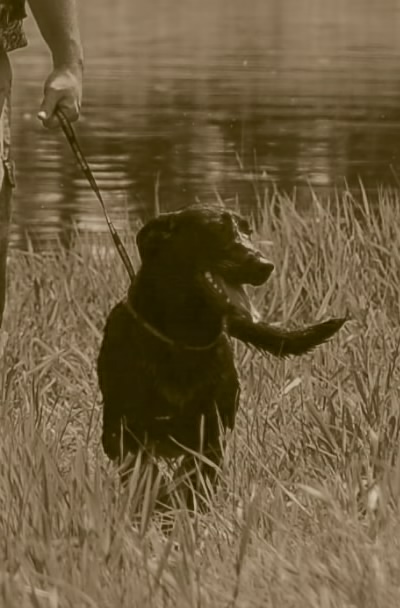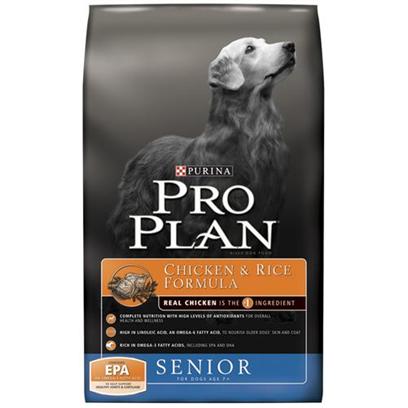Care as the Senior Hunting Dog Matures.
Humans and canines get older and slower as the years pass. Just like humans these signs can become visible in your hunting dog as they start to gray, slow down and even sleep more.
While some breeds age more quickly than others, most dogs are considered "seniors" between seven and ten years. To help ensure your Hunting Dog enjoys their golden years comfortably, there are simple things you can do.
Over the years your dog has given you years of enjoyment and companionship, now it’s time for you to make the changes that they will need as they mature.
Make Some Dietary Changes

Keep your dog’s weight at a recommended level commensurate to their size and breed.
Dietary needs can change as they mature and you should consult your Veterinarian on any food changes you should make as your dog gets older. Remember, it’s more than just watching their weight!
Older dogs should be fed a smaller amount of food on a more frequent schedule. Feed them the same amount of food daily as normal, just break up the feedings, spreading it out over four meals throughout the day. However, the amount of food may have to change as activity levels decrease. We also recommend adding water to your dog’s food if they are on a standard kibble diet. This helps with digestion and with hydration.
Some older dogs should be fed smaller meals to prevent intestinal issues.
Older dogs are more affected by added weight, so it is important to watch their weight and to help them lose any excess pounds. Overweight older dogs are at a higher risk for developing diabetes and other issues.
Veterinarians may recommend pet owners start using a senior food low in fat and high in protein when the pet is seven

years of age, but that can depend on the breed. We feed an “all age” performance dog food that has worked well for us over the years.
You should also ask your vet about any additional nutritional supplements appropriate for your dog's breed and age. German shepherds, for example, are prone to joint problems early on.
Regular Vet Visits
Senior dogs should see a vet for a thorough wellness check semi-annually. Your vet will check your senior dog's eyes, mouth, teeth, skin, fur, ears, and heart. There are also routine screening tests for early detection of a variety of common older age problems such as:
- Diabetes
- Arthritis and other degenerative joint diseases
- Diabetes
- Liver and kidney problems
- Prostate and breast cancers
Unusual behaviors that require an immediate appointment
include the following:
- Shortness of breath or continual coughing
- Changes in weight or appetite
- Urinary incontinence, diarrhea, or constipation
- Weakness or stiffness Uncommon aggression or strange unexplained behavior changes
We recommend that if you notice any unusual behavior in your pet that you consult your
Veterinarian just in case it turns out to be a more serious problem than it looks.
Your vet can help you monitor your aging pet's needs so that you can keep your dog comfortable and in the best health possible. And don't forget about your loved one's teeth while at the vet. A professional cleaning can help your pet eat and chew more comfortably. I recommend that if you are not comfortable with your local Vet that you as around and find a Vet that you are happy with, I use a
vet that came highly recommended from other professionals in the industry.
General First Aid
It’s always a good idea to have general knowledge of pet first aide. There are several good articles on this topic and you can always ask the advice of your Veterinarian. We also suggest always carrying a good
dog First -Aid kit with you on any travels, it’s always better to be safe than sorry!
Making Your Senior Dog More Comfortable
Luckily, there are several easy things you can do to help your senior dog enjoy the later years.

Senior dogs are more vulnerable to the weather, so it is important they don't spend too much time exposed to heat, cold and humidity. Older dogs just can't handle the extreme temperatures they were once able to.
An orthopedic bed or
kennel pad can help your senior dog rest more comfortably and sleep more deeply. Dog ramps will help your arthritic pet get up and down places that used to be easy and help prevent injury in almost any dog.
Think about rearranging the furniture to make it easier for your dog's weakening eyesight. Keeping clutter off the floor removes obstacles, which also decreases anxiety. Remember dogs are creatures of habit and can adapt fairly well to fading eye sight, but as soon as you start rearranging your furniture is when they will start having problems. Relate this to getting up in the middle of the night and running into a child’s toy or chair that was not put back in its correct place.
Some larger breeds would benefit from using a raised feeder so that they can reach their food and water easily and also helps provide a healthy feeding position.
Even just providing an additional blanket will help make your pet more comfortable. Don't forget, your 12-year-old dog is potentially equivalent to 77 years old in human years.
Last but not least, if your Hunting Dog is like any of ours; the mind wants to go and the body doesn’t. It’s up to us as owners to regulate the activity that our dogs get as they get older and not hurt themselves trying to do something they want to do, but can’t!
Our dogs provide us with years of love, companionship and memories, the least we can do is help make them comfortable for as long as we can.
Joe Scarpy - Owner/Trainer
At HuntEmUp.com, we know sporting dogs. From the time they’re a puppy, through their senior years, we'll keep you informed on the latest news and information. For more information on Training, Preparing and Caring for your Dogs, read our
Hunting and Sporting Dog blog.
Join Our HuntEmUp.com Customer Club Today!
Join Our Customer Club and be entered in our Monthly Giveaway and a chance to Win products and more!
Join for FREE Today - Click Below to Get Started!




 Keep your dog’s weight at a recommended level commensurate to their size and breed.
Dietary needs can change as they mature and you should consult your Veterinarian on any food changes you should make as your dog gets older. Remember, it’s more than just watching their weight!
Older dogs should be fed a smaller amount of food on a more frequent schedule. Feed them the same amount of food daily as normal, just break up the feedings, spreading it out over four meals throughout the day. However, the amount of food may have to change as activity levels decrease. We also recommend adding water to your dog’s food if they are on a standard kibble diet. This helps with digestion and with hydration.
Some older dogs should be fed smaller meals to prevent intestinal issues.
Older dogs are more affected by added weight, so it is important to watch their weight and to help them lose any excess pounds. Overweight older dogs are at a higher risk for developing diabetes and other issues.
Veterinarians may recommend pet owners start using a senior food low in fat and high in protein when the pet is seven
Keep your dog’s weight at a recommended level commensurate to their size and breed.
Dietary needs can change as they mature and you should consult your Veterinarian on any food changes you should make as your dog gets older. Remember, it’s more than just watching their weight!
Older dogs should be fed a smaller amount of food on a more frequent schedule. Feed them the same amount of food daily as normal, just break up the feedings, spreading it out over four meals throughout the day. However, the amount of food may have to change as activity levels decrease. We also recommend adding water to your dog’s food if they are on a standard kibble diet. This helps with digestion and with hydration.
Some older dogs should be fed smaller meals to prevent intestinal issues.
Older dogs are more affected by added weight, so it is important to watch their weight and to help them lose any excess pounds. Overweight older dogs are at a higher risk for developing diabetes and other issues.
Veterinarians may recommend pet owners start using a senior food low in fat and high in protein when the pet is seven  years of age, but that can depend on the breed. We feed an “all age” performance dog food that has worked well for us over the years.
You should also ask your vet about any additional nutritional supplements appropriate for your dog's breed and age. German shepherds, for example, are prone to joint problems early on.
years of age, but that can depend on the breed. We feed an “all age” performance dog food that has worked well for us over the years.
You should also ask your vet about any additional nutritional supplements appropriate for your dog's breed and age. German shepherds, for example, are prone to joint problems early on.
 Senior dogs are more vulnerable to the weather, so it is important they don't spend too much time exposed to heat, cold and humidity. Older dogs just can't handle the extreme temperatures they were once able to.
An orthopedic bed or kennel pad can help your senior dog rest more comfortably and sleep more deeply. Dog ramps will help your arthritic pet get up and down places that used to be easy and help prevent injury in almost any dog.
Think about rearranging the furniture to make it easier for your dog's weakening eyesight. Keeping clutter off the floor removes obstacles, which also decreases anxiety. Remember dogs are creatures of habit and can adapt fairly well to fading eye sight, but as soon as you start rearranging your furniture is when they will start having problems. Relate this to getting up in the middle of the night and running into a child’s toy or chair that was not put back in its correct place.
Some larger breeds would benefit from using a raised feeder so that they can reach their food and water easily and also helps provide a healthy feeding position.
Even just providing an additional blanket will help make your pet more comfortable. Don't forget, your 12-year-old dog is potentially equivalent to 77 years old in human years.
Last but not least, if your Hunting Dog is like any of ours; the mind wants to go and the body doesn’t. It’s up to us as owners to regulate the activity that our dogs get as they get older and not hurt themselves trying to do something they want to do, but can’t!
Our dogs provide us with years of love, companionship and memories, the least we can do is help make them comfortable for as long as we can.
Joe Scarpy - Owner/Trainer
At HuntEmUp.com, we know sporting dogs. From the time they’re a puppy, through their senior years, we'll keep you informed on the latest news and information. For more information on Training, Preparing and Caring for your Dogs, read our Hunting and Sporting Dog blog.
Senior dogs are more vulnerable to the weather, so it is important they don't spend too much time exposed to heat, cold and humidity. Older dogs just can't handle the extreme temperatures they were once able to.
An orthopedic bed or kennel pad can help your senior dog rest more comfortably and sleep more deeply. Dog ramps will help your arthritic pet get up and down places that used to be easy and help prevent injury in almost any dog.
Think about rearranging the furniture to make it easier for your dog's weakening eyesight. Keeping clutter off the floor removes obstacles, which also decreases anxiety. Remember dogs are creatures of habit and can adapt fairly well to fading eye sight, but as soon as you start rearranging your furniture is when they will start having problems. Relate this to getting up in the middle of the night and running into a child’s toy or chair that was not put back in its correct place.
Some larger breeds would benefit from using a raised feeder so that they can reach their food and water easily and also helps provide a healthy feeding position.
Even just providing an additional blanket will help make your pet more comfortable. Don't forget, your 12-year-old dog is potentially equivalent to 77 years old in human years.
Last but not least, if your Hunting Dog is like any of ours; the mind wants to go and the body doesn’t. It’s up to us as owners to regulate the activity that our dogs get as they get older and not hurt themselves trying to do something they want to do, but can’t!
Our dogs provide us with years of love, companionship and memories, the least we can do is help make them comfortable for as long as we can.
Joe Scarpy - Owner/Trainer
At HuntEmUp.com, we know sporting dogs. From the time they’re a puppy, through their senior years, we'll keep you informed on the latest news and information. For more information on Training, Preparing and Caring for your Dogs, read our Hunting and Sporting Dog blog.


